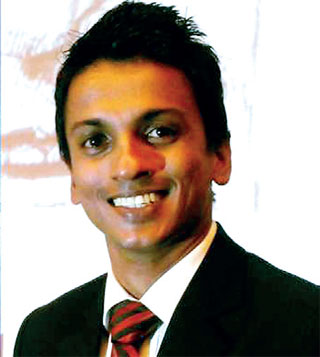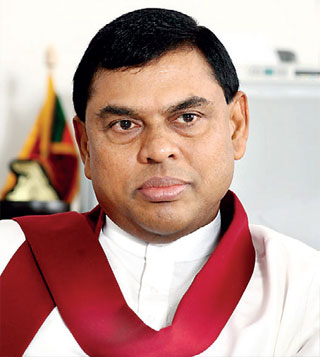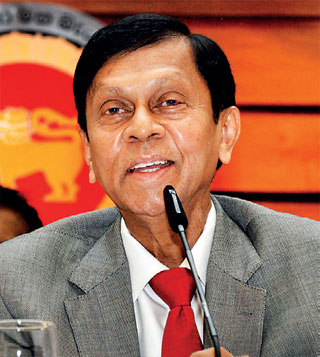Wednesday Feb 25, 2026
Wednesday Feb 25, 2026
Monday, 21 February 2022 01:39 - - {{hitsCtrl.values.hits}}

Advocata Chief Operating Officer Dhananath Fernando

Finance Minister Basil Rajapaksa

CB Governor Ajith Nivard Cabraal
`
|
 Advocata: Analysing economy while improving economics literacy
Advocata: Analysing economy while improving economics literacy
Sri Lanka’s economics think-tank, Advocata Institute, in a video clip in Sinhala (available at: https://youtu.be/ZKPSL3nwGmA) has suggested a seven-fold policy prescription to reset the economy now in a perilous state on all counts if authorities want to avoid IMF and go for their much-publicised homegrown solution. The story is narrated to the viewers by the communicator par excellence, Dhananath Fernando, who is versed in both Sinhala and English equally.
Advocata Institute was built from scratch a few years back by the Sri Lanka born economist Razeen Sally to analyse economic issues, make policy suggestions, and help Sri Lankans gain economics literacy. Now it is being run by a team of reputed Sri Lankan economists.
An old wiseman’s advice to a little boy in economics
Dhananath Fernando in his usual viewer-friendly style tells the IMF story to viewers as follows:
The title of the video is very appropriate: “Son, before thinking of going to IMF, reset the economy”. It is presented in the style of the advice given by an ‘old wiseman’ to ‘economics naivetes’ in the Central Bank and the Government on what they should do. The main message is ‘Look at the final goal and go for it rather than savouring in small gains’. This is presented by Dhananath by using a very apt parable involving a pilgrimage to the Sacred Sri Pada Mountain. The objective of the pilgrimage is to worship the sacred footprint of the Buddha. But on the way, you stop and enjoy sweets and pronounce that you have done your job. This is exactly what is being done by the present policy leaders of the Government.
Basil being corrected by Nivard
Dhananath starts his story from an answer given by the Minister of Finance, Basil Rajapaksa, to a question raised by a journalist at a press conference. The journalist asks Basil whether he intends to seek assistance from IMF to resolve the present external sector crisis in Sri Lanka. Basil laughs away the question saying that it is a forbidden topic. But then, he gives an explanation about the present state of the issue. He says that though Sri Lanka has not officially asked for financial assistance, his ministry has requested in writing for technical support from the Fund. That is because the Fund is the best adviser on these matters.
The project involved in the technical advice is being funded by the Japanese government. Once that advice is delivered to the Government, it would consider whether to implement the same having studied its merits and demerits.
Though Basil had not said about Sri Lanka’s seeking IMF advice, the media had misquoted him as saying so. This had prompted the Central Bank Governor Ajith Nivard Cabraal who is openly opposed to an IMF type bailout and believes in a homegrown package issues a Twitter message denying such request being made. Instead, what had been requested for had been routine technical advice on the establishment of a macro policy unit in the Ministry capable of analysing fiscal policy from a macro point of view. Governor Cabraal’s position was corroborated by IMF later in a reply to a question posed to it by French News Agency, AFP.
Is Central Bank being sidelined?
The type of policy analysis which this new unit is going to make is presently made by the Central Bank and this new development means that the Ministry does not want to listen to the Bank anymore and it wants to have its own capacity to do so. It seems that the Ministry of Finance is gradually keeping the Central Bank away from its policy advice role. This is not a salutary development because the Central Bank’s policy analysis covers the impact of fiscal policy on monetary policy and exchange rate policy as well. Without that input, it is unlikely that the Ministry of Finance could make prudent fiscal policy measures.
IMF’s general resources: Lending from non-using members to deficit members
Dhananath then explains in detail what type of financial assistance that Sri Lanka can get from IMF. They are all extended from the fund’s General Resource Account which is made up of a pool of currencies and reserve assets taken from the fully paid capital subscriptions of members known in IMF’s terminology as quotas (available at: https://www.imf.org/external/pubs/ft/pam/pam45/pdf/chap2.pdf). Hence, if Sri Lanka borrows from IMF, it is the money it has given to the Fund by way of capital if the borrowing is equal to its quota.
If the borrowing is more than the quota, which is the norm, it borrows in addition out of the capital of those members who have not used Fund’s resources. A prominent such member is USA which has provided capital to IMF but not borrowed from it. Hence, it is important for using members to have non-using members in the Fund, because, if all start using IMF money, it will soon run out of money and become bankrupt before the member countries.
Available funding lines for members
There are three such loan schemes available for Sri Lanka. One is called the Standby Facility under which the Fund remains by the side of the member country when it starts an IMF program that includes the implementation of an economic reform program. It is like when a patient is being administered a medication, the doctor remains ready to attend to any emergency by the side of his bed. If the country gets into trouble, IMF is ready to give further support by way of technical advice and other facilities.
The second is called the Extended Fund Facility which is a little more advanced than the previous one. Its repayment period is also longer. The third is the rapid finance facility under which the country can withdraw moneys from its share capital contribution which is known in IMF terminology as ab outright purchase. When the money so withdrawn is repaid, it is called repurchase.
Sri Lanka has been a user of IMF money
Sri Lanka has obtained IMF support on 16 occasions starting from 1965 though the country joined IMF as early as 1950. So, there had not been any attempt by the country at seeking IMF support during the first 15 years of its membership, though the country had had balance of payments difficulties during that period. The country had adopted a homegrown policy in the form of stringent import and exchange controls to resolve the balance of payments problems. When they were not successful, the Government of the day had decided to go for IMF support in 1965. Since then, in the next five decades, seeking IMF support had been a regular event in Sri Lanka.
NM’s advice to present-day Finance Ministry: Put your own house in order if IMF is shunned
There had been some interesting features about these IMF loans though Dhananath had not dug into them. One is that in two instances in 1971 and 1974, the left-wing Finance Minister Dr. N.M. Perera decided to seek loans from IMF to resolve the grave balance of payments issues. The first loan-a standby arrangement-amounting to $ 25.6 million had been fully utilised indicating the successful completion of the program. Of the second one amounting to $ 29.6 million, only $ 8.5 million had been disbursed, an indication that the program had midway been aborted. But what is important is NM’s justification of seeking IMF’s assistance. As quoted by Sri Lanka born economist Premachandra Athukorala in an article on IMF and Sri Lanka, NM had said, “We cannot brush aside and completely ignore these international institutions; we can repudiate their terms only if we are prepared to face the far-reaching distortions.” Further he had said: “The Government’s efforts to put its own house in order is not the result of IMF advice but is the obvious thing to do in the national interest” It behooves the present Monetary Board of the Central Bank to listen to NM’s wise counsel given some five decades ago.
Sri Lanka has not been a good borrower
The other feature is that out of those 16 occasions, Sri Lanka had completed them only on nine occasions. On seven occasions, they had been aborted midway giving an opportunity to IMF critics to claim that IMF programs had not delivered results in the past. But Athukorala in the article mentioned above had documented that of the nine occasions on which programs were fully completed, economic growth in the country had been higher than the growth it had got when the programs had been aborted. Hence, it is the Sri Lankan authorities who should be blamed and not the Fund or its programs.
Restructure debt first
As explained by Dhananath, when IMF plans to provide help to a country, it does a debt sustainability analysis. In that analysis, an important feature is to examine whether the country could borrow money from the market. The market here is the international financial markets in which the country concerned can issue sovereign bonds and raise money. If the country has lost access to market, the country should act beforehand to reduce the debt because IMF does not want that country to use its resources to repay such debt.
Sri Lanka cannot issue anymore international sovereign bonds because the ones that have been issued are traded at a huge discount and its ratings have been reduced to a very low level, the prior action which Sri Lanka should take to be eligible to seek IMF support is to reduce its foreign debt levels. Sri Lanka should therefore seek to reduce its foreign debt immediately by speaking to foreign investors if it is interested in seeking IMF support. But according to IMF experts, the Government should implement immediately a wide economic reform program.
|
India’s experiment with IMF
India’s leading policy economist Montek Singh Ahluwalia in an interview with Advocata’s Murtaza Jafferjee and Sarath Rajapatirana had opined that what is more important is to introduce economic reforms instead of just going to IMF (available at: https://youtu.be/CFQEDTRpZcc). The country should take tougher action than what IMF seeks from that country. This is exactly what NM had said in 1971 when he had sought IMF support. As quoted above, NM had said that it is in the interest of the country to introduce those reforms. Accordingly, Dhananath comes up with seven-fold reform program which Sri Lanka should introduce in its own interest.
Give cash subsidies to the deserving
The first is to support the poor with a cash transfer system. This is because it is the poor who are most adversely affected by a reform program. Though Dhananath had not elaborated on this, this cash transfer need not be direct subsidy given to them. Money in their hand could be improved by allowing them a better market access too. Another way is to remove the obstacles that stand in their way for accessing the market. The development of marketplaces, dissemination of information, introducing effective forward sale systems, educating them of basic legal and quality requirements, and connecting them to big companies through justifiable contract systems are some of them.
Reforming the public service a must
The second is to reform the public service to provide an efficient service to the public and reforming the public enterprises. An inefficient public service is a curse to business. It adds to their costs, reduces their operations, and eats up their valuable scarce resources. By way of an addition to what Dhananath has presented, two reform programs for the public service can be suggested. One is to keep them on continuous training and learning. The other is to introduce advanced information and communication technology to affect an efficiency improvement in the public service.
Have independent central bank
The third relates to the adoption of a prudent monetary and exchange rate policy by the central bank. To deliver this, it is necessary to make the Central Bank independent of political interferences. This writer addressed the issue of central bank independence in the 2018 Anniversary Oration of the Bank (available at: https://youtu.be/IIO6UWkqrZw). The practice of the Central Bank today has been to keep the exchange rate at Rs. 200 a dollar arbitrarily and artificially. It has spawned a vibrant black market on one side and created shortages in imported raw materials, on the other. This has disrupted the supply chain affecting smooth production processes and caused innumerable difficulties to businesses. This must go as one measure to reset the economy on the initiative of Sri Lanka and not as a policy prescription of the Fund.
Simplify the tax system
The fourth strategy involves reforming the tax system. There is a necessity for simplifying the tax system. Import duties should be reduced only to three duty rates. To improve other taxes, tax base of the income tax should be expanded. This strategy is essential today because the government has on its own through a wrong policy caused the government revenue to fall by about Rs. 500 billion a year. The reform should therefore necessarily involve restoring the tax system that had prevailed prior to 2019.
Trust the global economy
The fifth strategy requires the country to join the global economy seamlessly. This is because Sri Lanka with its low natural resource base cannot function independently and separately from the rest of the world to deliver prosperity to people. In fact, no country today can afford to do so. As such, Sri Lanka should abandon its domestic economy based economic policy and embrace global supply chains.
Make doing business easier
The sixth calls upon the Government to make doing business easier. For this, it is necessary deregulate the economy across the board and remove all obstacles for businesses, especially startups, to get into new enterprises.
Restructure the debt
The seventh is to study the ways of debt restructuring and introduce such restructuring programs. This is also the prior action which Sri Lanka should take if it decides to go to IMF for assistance.
Reset the economy if IMF is to be shunned
The message given by Dhananath is clear. Sri Lanka should introduce its own reform program, or reset the economy, as NM had said in 1971, if it is interested in seeking IMF support to get out of the present economic malaise. Without such resetting, even an IMF program will not work, and critics of IMF will start blaming the Fund and not the reckless domestic policymakers, for the policy failure.
Today without such IMF program and without resetting the economy, those who are responsible for the failure could be directly identified. In a way, it is a salutary development.
(The writer, a former Deputy Governor of the Central Bank of Sri Lanka, can be reached at [email protected].)